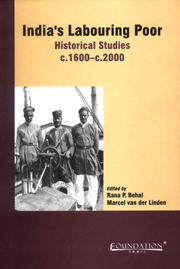Book contents
- Frontmatter
- Contents
- Notes on Contributors
- Frontispiece
- Preface
- Introduction
- Working Across the Seas: Indian Maritime Labourers in India, Britain, and in Between, 1600–1857
- The Brickmakers' Strikes on the Ganges Canal in 1848–1849
- On the Move: Circulating Labour in Pre-Colonial, Colonial, and Post-Colonial India
- Mobility and Containment: The Voyages of South Asian Seamen, c. 1900–1960
- Power Structure, Discipline and Labour in Assam Tea Plantations during Colonial Rule
- “Following Custom”? Representations of Community among Indian Immigrant Labour in the West Indies, 1880–1920
- Masculinity, Respect, and the Tragic: Themes of Proletarian Humor in Contemporary Industrial Delhi
- Stretching Labour Historiography: Pointers from South Asia
- DOCUMENT
- Select Bibliography
Stretching Labour Historiography: Pointers from South Asia
Published online by Cambridge University Press: 05 January 2012
- Frontmatter
- Contents
- Notes on Contributors
- Frontispiece
- Preface
- Introduction
- Working Across the Seas: Indian Maritime Labourers in India, Britain, and in Between, 1600–1857
- The Brickmakers' Strikes on the Ganges Canal in 1848–1849
- On the Move: Circulating Labour in Pre-Colonial, Colonial, and Post-Colonial India
- Mobility and Containment: The Voyages of South Asian Seamen, c. 1900–1960
- Power Structure, Discipline and Labour in Assam Tea Plantations during Colonial Rule
- “Following Custom”? Representations of Community among Indian Immigrant Labour in the West Indies, 1880–1920
- Masculinity, Respect, and the Tragic: Themes of Proletarian Humor in Contemporary Industrial Delhi
- Stretching Labour Historiography: Pointers from South Asia
- DOCUMENT
- Select Bibliography
Summary
PRIVILEGING FREE LABOUR
Studies of working people have long been framed by the concepts of “free” and “unfree” labour, a pair that distinguishes workers who are fully proletarianized from those who are not. Proletarians are working people without property, and therefore compelled to sell their capacities for money, but at the same time personally free to choose whom to sell their capacities to. Such (double-) free labour is contrasted with labour that is unfree, either because workers are compelled to offer their capacities to specific takers – under conditions established by those takers rather than by means of a labour market – or because these workers are not completely propertyless. Throughout the twentieth century, a dominant assumption among labour historians has been that the two concepts of free and unfree labour also reflect a basic trend in modern world history: the progressive replacement of unfree labour by free labour – or the progressive proletarianization of the world's workers.
Today, labour historians are much less sanguine about this belief. They have come to realize that the history of labour has never been a unilinear process in which unfree labour is being replaced by free labour. This realization has much to do with the fact that the study of labour is becoming de-provincialized. It used to be highly occidentalist in outlook. Based on empirical knowledge of labour in industrialized parts of Europe and North America (the “West”, or now more frequently: the “North”), it sought to construct theories that were deemed to be universally applicable.
- Type
- Chapter
- Information
- India's Labouring PoorHistorical Studies, 1600-2000, pp. 229 - 262Publisher: Foundation BooksPrint publication year: 2007
- 2
- Cited by



